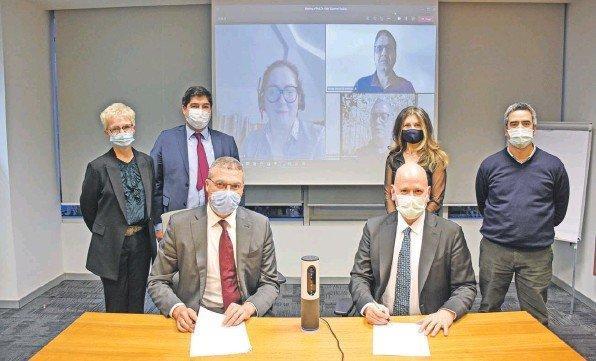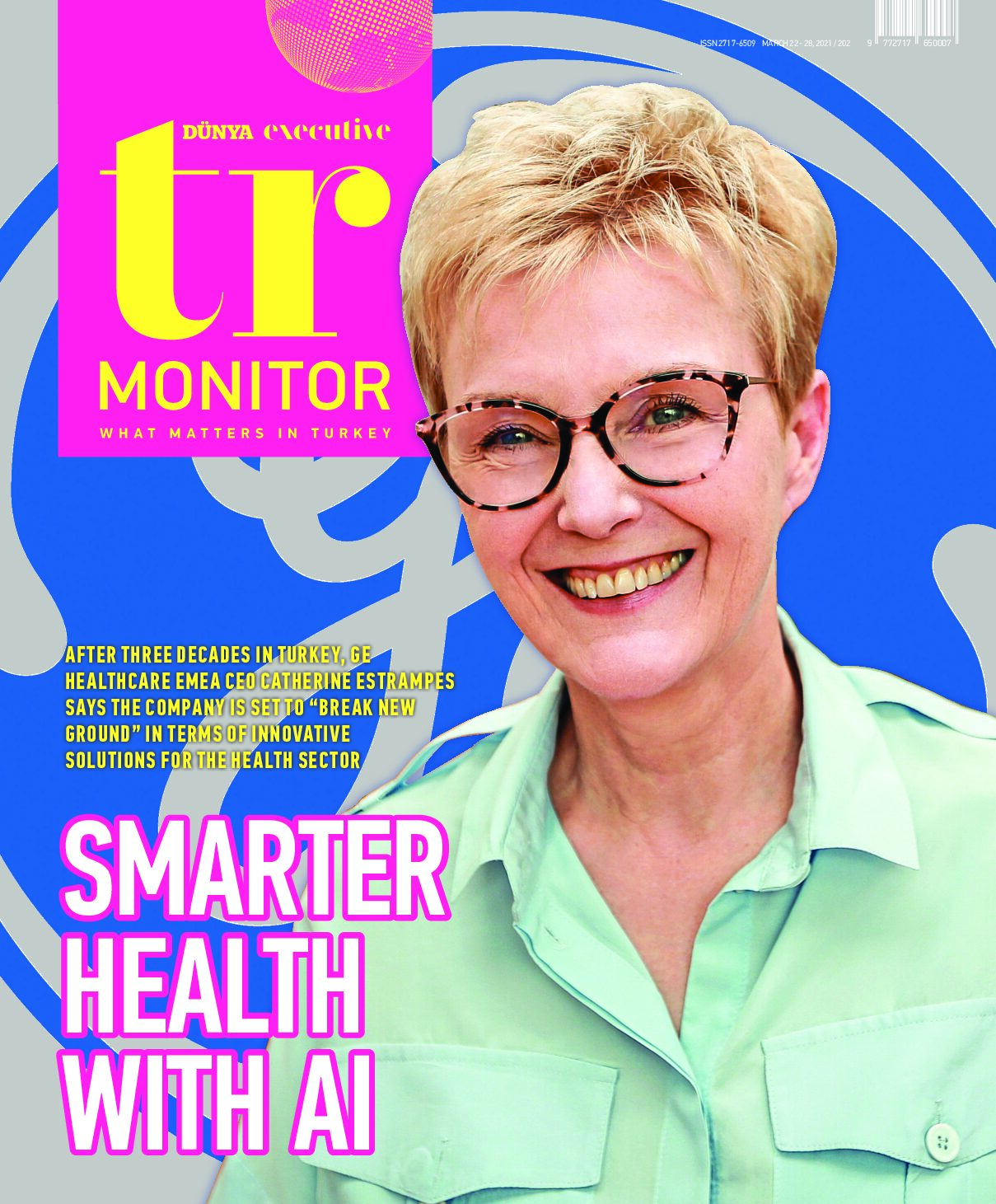By DIDEM ERYAR UNLU
CATHERINE ESTRAMPES President and CEO for Europe, Middle East and Africa (EMEA) at GE Healthcare, paid a visit to Turkey last week to finalize an agreement on the country’s first strategic collaboration to accelerate artificial intelligence (AI) development in medical imaging.
She defines this as a significant step forward in establishing an ecosystem for AI development in healthcare for Turkey, as well as the entire region. It also shows GE Healthcare’s commitment to Turkey in the long term, she adds, because “it is core to our regional strategy and often serves as a market where we can ‘break new ground’ in terms of innovative solutions.” AI and analytics are one of the core areas the company has been focusing on because of their potential to be game changers that will drive positive outcomes for all stakeholders in the health ecosystem.
GE Healthcare has a “proud history of partnership” in Turkey, as Estrampes frames it, with over 30 years supporting the development of the healthcare sector. Since opening the GE Healthcare office in Turkey in 1987, the company has grown to over 300 local staff, 60 of which are highly skilled field engineers and about 100 with regional roles. More than 40,000GE medical systems are installed in more than 3,000 health institutions in Turkey, touching more than 200,000 lives every day.
Having said that, an important milestone was achieved on Estrampes’ visit to Turkey. The company finalized an agreement with Prof. Dr. Muammer Hakki Karakas, Radiology Services Coordinator at the Provincial Health Directorate, for the country’s first strategic collaboration to accelerate AI development in medical imaging. “With this collaboration Prof. Karakas and his team of distinguished radiologists, data scientists and software developers will use GE Healthcare’s Edison Health Services to develop AI-based applications focused on the detection, categorization, and severity grading of COVID-19 to diagnose and treat patients,” says Estrampes.
The AI-based applications to be developed with Edison Health Services will also be used for the auto-detection and categorization of breast lesions through contrast-enhanced spectral mammography (CESM). This is a significant step considering breast cancer figures in Turkey, the second most frequent type of cancer at 24,175 cases or10.3% of all cancer cases, according to International Agency for Research on Cancer (IARC).
MARGIN PRESSURES ON HEALTH SYSTEM
AI development provides many benefits for the healthcare industry, which faces an array of challenges such as the growth and aging of global populations, escalating costs and growing complexity, according to Estrampes. She says that health systems are facing margin pressures and are looking to technology to help drive breakthroughs in patient outcomes, improve operational and clinical productivity, and find new areas of growth. “It is also becoming abundantly clear that Artificial Intelligence (AI) and analytics will be the game changers that will drive positive outcomes for patients as well as providers, caregivers, and other stakeholders across the health ecosystem.”
To understand AI’s potential to improve healthcare, Estrampes cites clinicians, who have been intubating more patients than usual during the pandemic. “Like many tasks in medicine, threading a breathing tube down a patient’s trachea requires skill, patience and steady hands. Doctors often order a chest x-ray to make sure the tube is positioned correctly. But now, GE’s critical care suite, which uses AI, is helping clinicians assess the placement of endotracheal tubes and make critical adjustments faster.”
GE’s AI detects the end of the tube, calculates its distance from the carina and displays the data on the X-ray monitor within seconds of capturing the image. “That instantaneous feedback can help give clinicians more confidence in their work and help identify which patients need additional adjustment,” she says. Software engineers trained the algorithm by feeding it X-ray images gathered from 32,000 intubations. “Training algorithms is like teaching children to read; if you point to a word and say it enough times, eventually they ’ll learn it.”
In 94% of cases, the new algorithm can provide the distance from the tip of a breathing tube to the carina within 1 centimeter, she adds. “This is AI empowering physicians so they can spend more time on what matters most: caring for patients.”
SUPPLIED FROM TURKEY DURING PANDEMIC
During the early stages of the pandemic, GE Healthcare ramped up production of critical spare parts for the ventilators, x-ray machines and CT scanners that would be key in treating COVID-19 patients. Many of these were housed at GE’s regional supply center here in Turkey, allowing faster support for hospitals in the country and the broader region.
This ramp up hasn’t been simple, Estrampes says. The entire medical device industry has faced unprecedented demand, and one of the greatest challenges has been the impact to the supply chain and getting critical components. “We had to get creative and teamed up with suppliers to coordinate an unprecedented logistics push, including chartering private flights to carry hundreds of tonnes of supplier parts and medical systems,” she says.
The company also innovated quickly. GE Healthcare’s CT-in-abox solution, a modular machine that captures the same robust imagery of a traditional CT scanner, was installed in Istanbul’s Cerrahpasa Hospital in May. “This was the first of its kind in Turkey and to-date, more than 5000 patients have been scanned at Cerrahpasa.”
Another step GE Healthcare took to increase the regional supply of ventilators was to work with its customers to identify and return their old, unused or malfunctioning ventilators to be repaired at their Turkey Repair Center. “While the number of refurbished ventilators by no means met the demand, every ventilator we were able to put back in use meant another patient could be treated.”
When the government took decisive action to commission emergency hospitals, GE Healthcare quickly mobilized to deliver 399 pieces of equipment including Computed Tomography (CT) scanners, Magnetic Resonance Imaging scanners, monitors, and Anesthesia Delivery systems at three important field hospitals in Sancaktepe, Yesilkoy and Hadimkoy in record time.
TELEHEALTH AND VIRTUAL CARE
COVID -19 accelerated existing trends and highlighted the need to build intelligence-based health systems, according to Estrampes. “Going forward, we need to extend these examples to other areas within the health system,” she says. “The rapid rise of telehealth and continued demand for these services from patients has led to technology infrastructure challenges needed to support this increase in virtual care.”
The demand for innovative technology in the healthcare sector that will make their machines more productive is increasing, Estrampes says. However, the technology must be simple, easy to use and leave space for clinicians to be intuitive and embedded in their existing workflows. “We saw this transition coming,” she notes, adding that that is why the company has been investing in digital technologies, including Edison, a secure intelligence platform that helps health providers take advantage of data in new and significant ways.
GE Healthcare’s Edison Health Services, which was commissioned by the Radiology Services of the Provincial Health Directorate, will hopefully help distinguished radiologists led by Prof. Dr. Muammer Hakki Karakas to develop AI-based applications for detection and treatment of not only COVID-19 cases, but also breast cancer.
“DIGITAL IS THE FUTURE BUT NO COMPANY CAN DO THIS ALONE”
“Building an intelligence-based health system requires a complete modernization of the current infrastructure to enable virtual hospitals, greater access to care and ultimately lower the cost of care delivery. We know that by changing the underlying technology infrastructure, we can deploy applications that will make a huge difference in the lives of both clinicians and patients. Digital is the future, and now is the time to make real progress. No one company can solve this alone, which is why we are creating an ecosystem, leveraging the strengths of clinicians, technology and academic partners, among others, to advance healthcare together.”
“HOSPITALS WILL ONLY TREAT THE SICKEST OF THE SICK”
“COVID-19 has been the primary focus of health systems globally. We’ve learned a lot in the past few months about both the disease and the potential consequences of holding off on treatment of pre-existing conditions. As we see health systems start to recover, patients still have some fear of going back into hospital for care. Our customers tell us that with COVID-19, we’ve seen a glimpse of the future. The utilization of hospitals is likely to continue to be lower than before. Hospitals will treat the sickest of the sick, with others cared for at home, and we’ll see more use of remote technologies to enable this. We need to look at the economics of the hospital system – ensure we recover some of the productivity lost to COVID-19, applying digital technology to smooth workflows and achieve productivity to keep operators safe and reduce exhaustion.”











